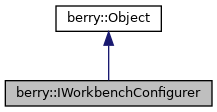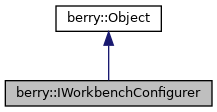#include <berryIWorkbenchConfigurer.h>


Public Member Functions | |
| berryObjectMacro (berry::IWorkbenchConfigurer) | |
| ~IWorkbenchConfigurer () override | |
| virtual IWorkbench * | GetWorkbench ()=0 |
| virtual bool | GetSaveAndRestore ()=0 |
| virtual void | SetSaveAndRestore (bool enabled)=0 |
| virtual IWorkbenchWindowConfigurer::Pointer | RestoreWorkbenchWindow (IMemento::Pointer memento)=0 |
| virtual void | EmergencyClose ()=0 |
| virtual bool | EmergencyClosing ()=0 |
| virtual IWorkbenchWindowConfigurer::Pointer | GetWindowConfigurer (IWorkbenchWindow::Pointer window)=0 |
| virtual Object::Pointer | GetData (const QString &key) const =0 |
| virtual void | SetData (const QString &key, Object::Pointer data)=0 |
| virtual bool | RestoreState ()=0 |
| virtual void | OpenFirstTimeWindow ()=0 |
| virtual bool | GetExitOnLastWindowClose ()=0 |
| virtual void | SetExitOnLastWindowClose (bool enabled)=0 |
 Public Member Functions inherited from berry::Object Public Member Functions inherited from berry::Object | |
| virtual QString | GetClassName () const |
| virtual Reflection::TypeInfo | GetTypeInfo () const |
| virtual QList< Reflection::TypeInfo > | GetSuperclasses () const |
| virtual void | Delete () |
| QDebug | Print (QDebug os, Indent Indent=0) const |
| virtual QString | ToString () const |
| virtual uint | HashCode () const |
| virtual bool | operator< (const Object *) const |
| void | Register () const |
| void | UnRegister (bool del=true) const |
| int | GetReferenceCount () const |
| void | SetReferenceCount (int) |
| void | AddDestroyListener (const MessageAbstractDelegate<> &delegate) const |
| void | RemoveDestroyListener (const MessageAbstractDelegate<> &delegate) const |
| virtual bool | operator== (const Object *) const |
Static Public Attributes | |
| static const int | RESTORE_CODE_RESET |
| static const int | RESTORE_CODE_EXIT |
Additional Inherited Members | |
 Public Types inherited from berry::Object Public Types inherited from berry::Object | |
| typedef Object | Self |
| typedef berry::SmartPointer< Self > | Pointer |
| typedef berry::SmartPointer< const Self > | ConstPointer |
| typedef berry::WeakPointer< Self > | WeakPtr |
| typedef berry::WeakPointer< const Self > | ConstWeakPtr |
 Static Public Member Functions inherited from berry::Object Static Public Member Functions inherited from berry::Object | |
| static const char * | GetStaticClassName () |
| static Reflection::TypeInfo | GetStaticTypeInfo () |
| static QList< Reflection::TypeInfo > | GetStaticSuperclasses () |
 Protected Member Functions inherited from berry::Object Protected Member Functions inherited from berry::Object | |
| Object () | |
| virtual | ~Object () |
| virtual QDebug | PrintSelf (QDebug os, Indent indent) const |
| virtual QDebug | PrintHeader (QDebug os, Indent indent) const |
| virtual QDebug | PrintTrailer (QDebug os, Indent indent) const |
 Protected Attributes inherited from berry::Object Protected Attributes inherited from berry::Object | |
| QAtomicInt | m_ReferenceCount |
| QMutex | m_ReferenceCountLock |
Detailed Description
Interface providing special access for configuring the workbench.
Note that these objects are only available to the main application (the plug-in that creates and owns the workbench).
This interface is not intended to be implemented by clients.
- See also
- WorkbenchAdvisor::Initialize()
- Note
- This interface is not intended to be implemented by clients.
Definition at line 38 of file berryIWorkbenchConfigurer.h.
Constructor & Destructor Documentation
◆ ~IWorkbenchConfigurer()
|
override |
Member Function Documentation
◆ berryObjectMacro()
| berry::IWorkbenchConfigurer::berryObjectMacro | ( | berry::IWorkbenchConfigurer | ) |
◆ EmergencyClose()
|
pure virtual |
Forces the workbench to close due to an emergency. This method should only be called when the workbench is in dire straights and cannot continue, and cannot even risk a normal workbench close (think "out of
memory" or "unable to create shell"). When this method is called, an abbreviated workbench shutdown sequence is performed (less critical steps may be skipped). The workbench advisor is still called; however, it must not attempt to communicate with the user. While an emergency close is in progress, EmergencyClosing() returns true. Workbench advisor methods should always check this flag before communicating with the user.
- See also
- EmergencyClosing()
◆ EmergencyClosing()
|
pure virtual |
Returns whether the workbench is being closed due to an emergency. When this method returns true, the workbench is in dire straights and cannot continue. Indeed, things are so bad that we cannot even risk a normal workbench close. Workbench advisor methods should always check this flag before attempting to communicate with the user.
- Returns
trueif the workbench is in the process of being closed under emergency conditions, andfalseotherwise
◆ GetData()
|
pure virtual |
Returns the data associated with the workbench at the given key.
- Parameters
-
key the key
- Returns
- the data, or
nullif there is no data at the given key
◆ GetExitOnLastWindowClose()
|
pure virtual |
Returns true if the workbench should exit when the last window is closed, false if the window should just be closed, leaving the workbench (and its event loop) running.
If true, the last window's state is saved before closing, so that it will be restored in the next session. This applies only if GetSaveAndRestore() returns true).
If false, the window is simply closed, losing its state.
If the workbench is left running, it can be closed using IWorkbench::Close(), or a new window can be opened using IWorkbench::OpenWorkbenchWindow(const QString&, IAdaptable*).
The initial value is true.
- Returns
trueif the workbench will exit when the last window is closed,falseif the window should just be closed
◆ GetSaveAndRestore()
|
pure virtual |
Returns whether the workbench state should be saved on close and restored on subsequent open.
The initial value is false.
- Returns
trueto save and restore workbench state, orfalseto forget current workbench state on close.
◆ GetWindowConfigurer()
|
pure virtual |
Returns an object that can be used to configure the given window.
- Parameters
-
window a workbench window
- Returns
- a workbench window configurer
◆ GetWorkbench()
|
pure virtual |
Returns the underlying workbench.
- Returns
- the workbench
◆ OpenFirstTimeWindow()
|
pure virtual |
Opens the first time window, using the default perspective and default page input.
This is typically called from the advisor's WorkbenchAdvisor::OpenWindows() method.
- See also
- WorkbenchAdvisor::OpenWindows()
◆ RestoreState()
|
pure virtual |
Restores the workbench state saved from the previous session, if any. This includes any open windows and their open perspectives, open views and editors, layout information, and any customizations to the open perspectives.
This is typically called from the advisor's WorkbenchAdvisor::OpenWindows() method.
- Returns
- a status object indicating whether the restore was successful
◆ RestoreWorkbenchWindow()
|
pure virtual |
Restores a workbench window from the given memento.
- Parameters
-
memento the memento from which to restore the window's state
- Returns
- the configurer for the restored window
- Exceptions
-
WorkbenchException if an error occurred during the restore
- See also
- IWorkbenchWindowConfigurer::SaveState(IMemento::Pointer)
◆ SetData()
|
pure virtual |
Sets the data associated with the workbench at the given key.
- Parameters
-
key the key data the data, or nullto delete existing data
◆ SetExitOnLastWindowClose()
|
pure virtual |
Sets whether the workbench should exit when the last window is closed, or whether the window should just be closed, leaving the workbench (and its event loop) running.
For more details, see GetExitOnLastWindowClose().
- Parameters
-
enabled trueif the workbench should exit when the last window is closed,falseif the window should just be closed
◆ SetSaveAndRestore()
|
pure virtual |
Sets whether the workbench state should be saved on close and restored on subsequent open.
- Parameters
-
enabled trueto save and restore workbench state, orfalseto forget current workbench state on close.
Member Data Documentation
◆ RESTORE_CODE_EXIT
|
static |
Restore status code indicating that the saved state could not be restored, and that the application must exit immediately without modifying any previously saved workbench state.
Definition at line 60 of file berryIWorkbenchConfigurer.h.
◆ RESTORE_CODE_RESET
|
static |
Restore status code indicating that the saved state could not be restored, but that startup should continue with a reset state.
- See also
- RestoreState()
Definition at line 52 of file berryIWorkbenchConfigurer.h.
The documentation for this struct was generated from the following file:
